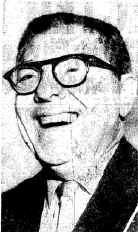
Victor H. Blanc
Philadelphia began looking into the matter of payola in June 1960
Philadelphia Payola
Hearing

Victor H. Blanc
Philadelphia began looking into the matter of payola in June 1960
Originally District Attorney Victor H. Blanc had begun a probe when he had interrogated thirty-nine deejays and other broadcast and record company personnel. When the House's hearings end Blanc sent members of his staff to Washington. They returned to Philadelphia with a filing cabinet full of documents obtained from the House hearings.. Blanc claimed that they showed that over $300,000 of payola had been paid in Philadelphia. Prosecutions resulting from his investigation would be under the Pennsylvania Bribery Act. All local stations were to be looked into except Clark's station WFIL which had been given "clean bill of health" by the FTC and FCC said Blanc. Blanc also added that the information he and his staff had didn'i involve Clark. Blanc publicly said that Clark was innocent of payola. Clark agreed to head a local disk jockey association designed to allow deejays to police themselves against future payola. The association was the brainchild of Blanc. A few months later Blanc announced that he had evidence against deejays and distributors but could not prosecute them for bribery because the all would invoke their fifth amendment privilege and refuse to testify against each other. Blanc's response was to to have the twenty-one deejays and eleven distributors permanently enjoined by a city judge from taking or giving payola. When granting Blanc's request Judge David Almoign said Blanc "Had shown ingenuity in finding a path to the solution of the payola problem." All those involve signed consent agreements. promising not to accept payola in the future while not admitting they had in the past.. Taking payola in the future would lead to contempt of court proceedings. By signing the agreements they were given immunity on payola charges prior to March 1, 1960. Any that refused to sign - none did - would have been subjected to civil proceedings rather than criminal indictment because of the refusal of the principals to testify.